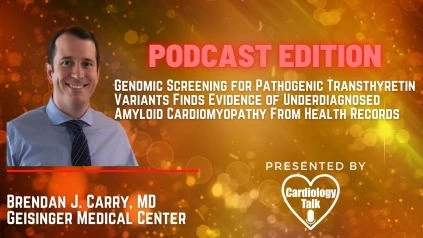Podcast- Brendan J. Carry, MD- Genomic Screening for Pathogenic Transthyretin Variants Finds Evidence of Underdiagnos...
Dr. Brendan Carry is an American Board of Internal Medicine certified Cardiologist who attended Thomas Jefferson University. In this video Dr. Carry will discuss Genomic Screening for Pathogenic Transthyretin Variants Finds Evidence of Underdiagnosed Amyloid Cardiomyopathy From Health Records
Link to Abstract-
https://www.jacc.org/doi/10.1016/j.jaccao.2021.07.002
Abstract
Background
New treatments for transthyretin amyloidosis help patients live longer, but diagnosis is still difficult. Transthyretin amyloidosis is caused by pathogenic or probable pathogenic (P/LP) mutations in the transthyretin (TTR) gene, and genomic screening has been proposed to detect at-risk individuals. However, there is a lack of data on illness characteristics and penetrance to help determine the efficacy of population-based genomic screening for TTR.
Objectives
This study looked at the prevalence of P/LP variations in TTR discovered using exome sequencing, as well as the burden of disease associated with these variants based on electronic health records for people with these variants from a large (N = 134,753), mostly European-ancestry sample.
Methods
Individuals with and without P/LP TTR mutations were compared in terms of the frequency of common illness symptoms and cardiac imaging findings.
Results
We found P/LP TTR variations in 157 of 134,753 (0.12 percent) people (43 percent male, median age 52 [Q1-Q3: 37–61] years). All findings were accounted for by seven P/LP variations, the bulk of which were V122I. (p.V142I; 113, 0.08 percent ). African ancestry was found in approximately 60% (n = 91) of people with P/LP TTR mutations (all V122I). Although associated heart disease diagnoses, such as cardiomyopathy and heart failure, were considerably higher in individuals with P/LP TTR variations who were over 60 years old, amyloidosis diagnoses were rare (2 of 157 patients). Only one of the 14 percent (7 of 49) of people aged 60 or older with a P/LP TTR variation had cardiac disease and a ventricular septal thickness greater than 1.2 cm, and only one of them had amyloidosis.
Conclusions
Individuals with P/LP TTR variations discovered through genomic screening had a higher risk of heart disease after 60 years, despite the fact that amyloidosis is likely underdiagnosed without knowing the genetic variant.



